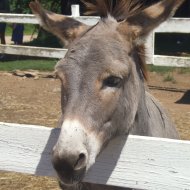
Dental disease in 77 per cent of the donkeys put down
The Donkey Sanctuary says one in ten donkeys it cares for has to be put down within three years with dental disease paying a heavy toll.
It says that dental disease is the second most common veterinary medical problem it experiences in donkeys.
More than three quarters of the donkeys it euthanised, had moderate to severe dental disease.
"These donkeys are not necessarily euthanised solely due to dental disease, but being unable to grasp or chew food thoroughly enough to swallow, or perhaps harbouring the painful infection of gum disease when otherwise ill or when suffering multiple conditions, places a huge and largely unnecessary burden on the animal’s quality of life and prognosis," said the sanctuary.
In less than five years, a donkey with good oral health can deteriorate to serious levels of disease, equine dental technicians based at the sanctuary report.
They say that contrary to popular belief donkeys usually start out with good teeth but that they dental health declines severely over time. Thorough, high quality, regular preventative dental care from an early age can prevent this.
The sanctuary's dental team recommends owners use qualified vets or equine dental technicians that are members of the British Association of Dental Technicians (BAEDT).
For more information on donkey dentistry click here.



 The Federation of Independent Veterinary Practices (FIVP) has announced a third season of its podcast, Practice Matters.
The Federation of Independent Veterinary Practices (FIVP) has announced a third season of its podcast, Practice Matters.